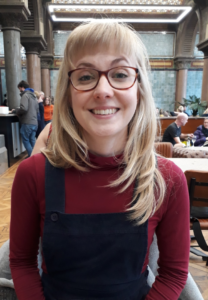First in our new blog series ‘Get to know… your WRDTP student reps’ is Rosalind Latham! Roz did her BSc in Biology at the University of York, with a year in Industry in Pharmaceutical research. Highlights of her degree were learning about biotechnology and how to genetically engineer plants/microbes for human benefit.
After gaining industrial experience in a Fast-Moving-Consumer-Goods Graduate Scheme, Roz decided to go back to science and plant biotechnology, which she specialised in as an undergraduate. She’s now 8 months into her PhD and loving it!
We asked Roz a few more questions about her life in and outside of the lab – keep reading to find out how DNA origami can help us get better crops, Roz’s favourite Yorkshire spots and what you should (not) do when growing archaea!
Describe your research in one tweet.
Trying to use DNA-nanotechnology to improve the efficiency and accuracy of gene editing (specifically gene targeting) in plants, to aid the development of the crops of the future.
Can you tell us a bit more about how DNA nanotechnology works? I am but a protein biochemist!
The DNA nanotechnology I am working with in my PhD is called DNA ‘origami’, which as the name suggests involves folding DNA into pre-determined shapes that confers structure and functionality. DNA origami has been developed to create various technologies, from inducible drug-delivery ‘boxes’ to biosensors and transgene delivery vectors. I will be using these origami structures to conceal my gene-targeting template (analogous to a Trojan Horse), and in doing so hopefully avoid some of the off-target effects that happen during gene targeting.
If there’s a project you could do with unlimited resources and access, what would you want to do?
To be honest I’d do my current PhD project because I love the project area, the nanotechnology and what it’s trying to achieve. Having unlimited resources would be amazing!
What do you do when you’re not sciencing?
I’m keen to keep up a life outside the lab, I think it’s really important for your mental health and motivation. I am training for a triathlon so lots of time is spent in the pool/on the bike (I often neglect the running part…). I also play the saxophone in a local jazz band and love meeting up with friends, often for hikes in the gorgeous Yorkshire countryside.
What are your top 2 Yorkshire hikes? I’m sure some of the DTP students could take inspiration!
There are loads of great places to go walking in the local area. My top 2 ones are Marsden Moor at the top of the Peak District, and Hardcastle Crags near Hebden Bridge (both are accessible by train). A bit further afield are Bolton Abbey and Fountains Abbey.
What do you value most about working in science?
To be able to do something I am passionate about. Not everyone has a true passion and you’re very fortunate if you do and you’re able to pursue it. Even if science can be tough sometimes!
Who has most influenced your career so far?
I don’t have one single person but there have been lots of really great, supportive people along the way. Of course a good Biology teacher made a big impact. But so did my colleagues in my first non-science job who supported me in leaving industry to go back to science because it’s what I am really interested in.
Which of the skills you developed in industry have you found most valuable for settling into your PhD?
Confidence; in my own critical ability and ideas, and that my questions and insights are valid, while acknowledging the limits of my own knowledge and experience. It might be easy to feel intimidated by the expertise of the academics we work with, but you’re there as a Post Graduate Researcher to offer your thoughts and ideas, and having 3 years in industry really gave me the confidence to share these openly. Project management, self-awareness and driving my own personal development are also key skills I learnt during my time in industry.
We all mess up sometimes… What’s your biggest lab mistake?
I’m still embarrassed to admit that for about a month of monitoring the growth rate of archaea under different conditions, I am pretty sure I forgot to ever top up their carbon source (food) and wondered why the growth rate decreased so dramatically. I didn’t realise until after I’d finished the experiment either!

